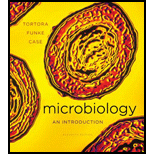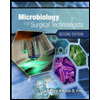
Microbiology: An Introduction
11th Edition
ISBN: 9780321733603
Author: Gerard J. Tortora, Berdell R. Funke, Christine L. Case
Publisher: Benjamin Cummings
expand_more
expand_more
format_list_bulleted
Question
Chapter 21, Problem 3CAE
Summary Introduction
Case summary:
A confirmed case of influenza who was hospitalized later developed respiratory distress. The symptoms included fever, rash, and low blood pressure. The respiratory secretions showed Staphylococcus aureus in culture. The etiological agent for the above mentioned symptoms is S. aureus and the relationship is discussed below.
Characters of the case:
- The young teenager hospitalized with influenza
- The influenza further leads to complication
- The patient develops respiratory distress
- S. aureus is responsible for this complication
Expert Solution & Answer
Want to see the full answer?
Check out a sample textbook solution
Students have asked these similar questions
Skip to main content
close
Homework Help is Here – Start Your Trial Now!
arrow_forward
search
SEARCH
ASK
Human Anatomy & Physiology (11th Edition)BUY
Human Anatomy & Physiology (11th Edition)
11th Edition
ISBN: 9780134580999
Author: Elaine N. Marieb, Katja N. Hoehn
Publisher: PEARSON
1 The Human Body: An Orientation
expand_moreChapter 1 : The Human Body: An Orientation
Chapter Questions
expand_moreSection: Chapter Questions
Problem 1RQ: The correct sequence of levels forming the structural hierarchy is A. (a) organ, organ system,...
format_list_bulletedProblem 1RQ: The correct sequence of levels forming the structural hierarchy is A. (a) organ, organ system,...
See similar textbooks
Bartleby Related Questions Icon
Related questions
Bartleby Expand Icon
bartleby
Concept explainers
bartleby
Question
Draw a replication bubble with two replication forks.blue lines are DNA single strands and red lines are RNA single strands.indicate all 3' and 5’ ends on all DNA single…
Provide an answer
Question 4
1 pts
Which of the following would be most helpful for demonstrating alternative splicing for a
new organism?
○ its proteome and its transcriptome
only its transcriptome
only its genome
its proteome and its genome
Chapter 21 Solutions
Microbiology: An Introduction
Ch. 21 - Discuss the usual mode of entry of bacteria into...Ch. 21 - What bacteria are identified by a positive...Ch. 21 - Prob. 3RCh. 21 - Complete the table of epidemiology below.Ch. 21 - Why do some states require a test for antibodies...Ch. 21 - Prob. 6RCh. 21 - Prob. 7RCh. 21 - Prob. 8RCh. 21 - Prob. 9RCh. 21 - A laboratory test used to determine the identity...
Ch. 21 - Prob. 2ACh. 21 - Prob. 3ACh. 21 - Prob. 4ACh. 21 - Prob. 1MCQCh. 21 - Prob. 2MCQCh. 21 - Prob. 3MCQCh. 21 - A 12-year-old boy had a fever, rash, headaches,...Ch. 21 - A patient has conjunctivitis. If you isolated...Ch. 21 - You microscopically examine scrapings from a case...Ch. 21 - Prob. 7MCQCh. 21 - Prob. 8MCQCh. 21 - Prob. 9MCQCh. 21 - Prob. 10MCQCh. 21 - Prob. 1CAECh. 21 - Prob. 2CAECh. 21 - Prob. 3CAE
Knowledge Booster
Similar questions
- What did the Cre-lox system used in the Kikuchi et al. 2010 heart regeneration experiment allow researchers to investigate? What was the purpose of the cmlc2 promoter? What is CreER and why was it used in this experiment? If constitutively active Cre was driven by the cmlc2 promoter, rather than an inducible CreER system, what color would you expect new cardiomyocytes in the regenerated area to be no matter what? Why?arrow_forwardWhat kind of organ size regulation is occurring when you graft multiple organs into a mouse and the graft weight stays the same?arrow_forwardWhat is the concept "calories consumed must equal calories burned" in regrads to nutrition?arrow_forward
- You intend to insert patched dominant negative DNA into the left half of the neural tube of a chick. 1) Which side of the neural tube would you put the positive electrode to ensure that the DNA ends up on the left side? 2) What would be the internal (within the embryo) control for this experiment? 3) How can you be sure that the electroporation method itself is not impacting the embryo? 4) What would you do to ensure that the electroporation is working? How can you tell?arrow_forwardDescribe a method to document the diffusion path and gradient of Sonic Hedgehog through the chicken embryo. If modifying the protein, what is one thing you have to consider in regards to maintaining the protein’s function?arrow_forwardThe following table is from Kumar et. al. Highly Selective Dopamine D3 Receptor (DR) Antagonists and Partial Agonists Based on Eticlopride and the D3R Crystal Structure: New Leads for Opioid Dependence Treatment. J. Med Chem 2016.arrow_forward
- The following figure is from Caterina et al. The capsaicin receptor: a heat activated ion channel in the pain pathway. Nature, 1997. Black boxes indicate capsaicin, white circles indicate resinferatoxin. You are a chef in a fancy new science-themed restaurant. You have a recipe that calls for 1 teaspoon of resinferatoxin, but you feel uncomfortable serving foods with "toxins" in them. How much capsaicin could you substitute instead?arrow_forwardWhat protein is necessary for packaging acetylcholine into synaptic vesicles?arrow_forward1. Match each vocabulary term to its best descriptor A. affinity B. efficacy C. inert D. mimic E. how drugs move through body F. how drugs bind Kd Bmax Agonist Antagonist Pharmacokinetics Pharmacodynamicsarrow_forward
arrow_back_ios
SEE MORE QUESTIONS
arrow_forward_ios
Recommended textbooks for you
 Comprehensive Medical Assisting: Administrative a...NursingISBN:9781305964792Author:Wilburta Q. Lindh, Carol D. Tamparo, Barbara M. Dahl, Julie Morris, Cindy CorreaPublisher:Cengage Learning
Comprehensive Medical Assisting: Administrative a...NursingISBN:9781305964792Author:Wilburta Q. Lindh, Carol D. Tamparo, Barbara M. Dahl, Julie Morris, Cindy CorreaPublisher:Cengage Learning Microbiology for Surgical Technologists (MindTap ...BiologyISBN:9781111306663Author:Margaret Rodriguez, Paul PricePublisher:Cengage LearningEssentials of Pharmacology for Health ProfessionsNursingISBN:9781305441620Author:WOODROWPublisher:Cengage
Microbiology for Surgical Technologists (MindTap ...BiologyISBN:9781111306663Author:Margaret Rodriguez, Paul PricePublisher:Cengage LearningEssentials of Pharmacology for Health ProfessionsNursingISBN:9781305441620Author:WOODROWPublisher:Cengage Medical Terminology for Health Professions, Spira...Health & NutritionISBN:9781305634350Author:Ann Ehrlich, Carol L. Schroeder, Laura Ehrlich, Katrina A. SchroederPublisher:Cengage Learning
Medical Terminology for Health Professions, Spira...Health & NutritionISBN:9781305634350Author:Ann Ehrlich, Carol L. Schroeder, Laura Ehrlich, Katrina A. SchroederPublisher:Cengage Learning



Comprehensive Medical Assisting: Administrative a...
Nursing
ISBN:9781305964792
Author:Wilburta Q. Lindh, Carol D. Tamparo, Barbara M. Dahl, Julie Morris, Cindy Correa
Publisher:Cengage Learning

Microbiology for Surgical Technologists (MindTap ...
Biology
ISBN:9781111306663
Author:Margaret Rodriguez, Paul Price
Publisher:Cengage Learning

Essentials of Pharmacology for Health Professions
Nursing
ISBN:9781305441620
Author:WOODROW
Publisher:Cengage

Medical Terminology for Health Professions, Spira...
Health & Nutrition
ISBN:9781305634350
Author:Ann Ehrlich, Carol L. Schroeder, Laura Ehrlich, Katrina A. Schroeder
Publisher:Cengage Learning